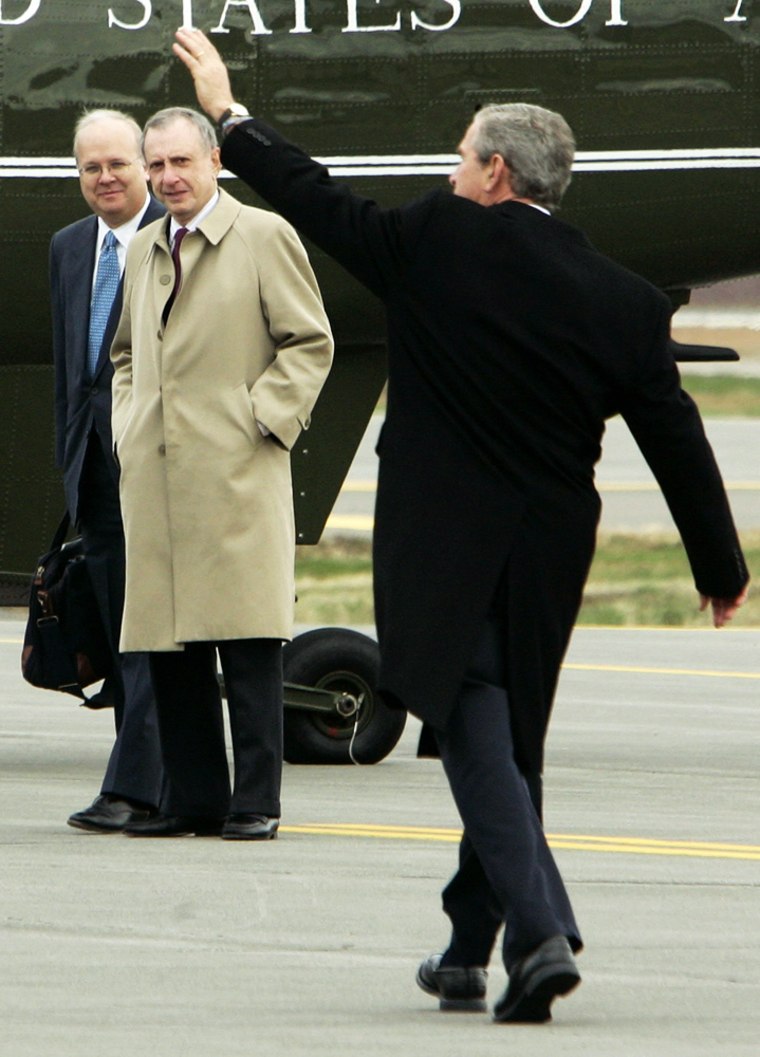The State of the Union address is a president’s chance to defend what he’s done in the past 12 months and to crow a bit about his successes.
As President Bush does that Tuesday night in the House chamber, the off-stage co-star of the performance will be Judiciary Committee Chairman Sen. Arlen Specter, R-Pa., his most important ally on Capitol Hill in the past several months.
Bush will likely be celebrating the Senate's confirmation Tuesday morning of Judge Samuel Alito to the Supreme Court, a win he could not have gotten without Specter’s skillful work.
Bush will also defend his order for the National Security Agency to monitor international calls to and from suspected al-Qaida contacts inside the United States. Specter has questioned the legality of the NSA program and has asked Attorney General Alberto Gonzales to defend it before the Judiciary Committee in hearings starting next Monday.
The State of the Union is also the president’s chance to tell members of Congress, as they start their year’s work, what he wants them to do.
Sometimes he succeeds.
In 1965 President Lyndon Johnson told Congress it must pass legislation to create what he called the “Great Society.” The Congress did so by passing the Medicare bill to provide health care for the elderly, a wild and scenic rivers bill to protect such natural wonders as Idaho's Salmon River, and the National Endowment for the Arts to subsidize choreography, poetry and music.
Grand ambitions
Johnson’s ambitions for the Great Society were vast — not merely to promote “the general Welfare” as the Constitution says, but to create programs to improve the quality of the American people themselves.
“The Great Society asks not how much, but how good; not only how to create wealth but how to use it; not only how fast we are going, but where we are headed,” Johnson declared on the night of Jan. 4, 1965. “It proposes as the first test for a nation: the quality of its people.”
Master showman as well as master legislator, Johnson was the creator of the State of the Union speech as a prime-time evening television event. In 1965, he ordered a shift in the timing of the address from its traditional mid-afternoon time to 9 p.m.
When Bush speaks to Congress Tuesday night, he’ll be doing it because Johnson set the standard. Bush will also be doing what the Constitution directs the president to do.
Article II says, “He shall from time to time give to the Congress Information on the State of the Union, and recommend to their Consideration such Measures as he shall judge necessary and Expedient.”
Last year Bush used the State of the Union to launch what he hoped would be his historic second-term achievement, a redesign of Social Security.
He urged Congress to give younger workers the option of putting some of the money they pay in Social Security taxes into personal retirement accounts.
Social Security failure
But Bush learned that even this Republican-majority Congress would permit no curtailing of Franklin Roosevelt’s New Deal and Johnson’s Great Society programs.
Now Bush comes before Congress at a moment when his administration is coping with the cost and the messy launch of Bush’s own Great Society initiative, the Medicare prescription drug entitlement.
Fiscal conservatives who voted against the drug entitlement, such as Rep. Mike Pence, R-Ind., say it is too expensive and ought to be limited to needy seniors with incomes below a certain threshold.
And Democrats are exploiting the entitlement’s confusing start as a 2006 campaign issue. But there’s no hint Bush will ask Congress to change the program.
Instead Bush will do what other presidents have done when they face difficulty: change the subject. One of his ideas Tuesday night will be a new initiative to subsidize individuals and small businesses so they can purchase medical insurance.
Lincoln’s rejection
Bush’s Social Security failure was hardly the first time a president has seen Congress reject his State of the Union centerpiece.
Even the president whom most historians see as our greatest, Abraham Lincoln, failed to get Congress to agree to the idea he set forth in his 1862 annual message: financial compensation to slave owners to free their slaves, followed by “deportation,” as he called it, of the freed slaves by sending them to Africa or Central America.
“New homes can be found for them in congenial climes, and with people of their own blood and race,” Lincoln told Congress.
“Is it doubted,” he asked, “that the plan I propose, if adopted, would shorten the war, and thus lessen its expenditures of money and of blood?”
Lincoln’s idea was too radical for 1862.
For a president on the ascendant, as Johnson was in 1965, the State of the Union is a time for grand visions. Presidents on the way out, as Johnson was on Jan. 14, 1969, when he made his last State of the Union address, sometimes acknowledge failure. “I regret more than any of you know that it has not been possible to restore peace to South Vietnam,” LBJ said.
Bush is far from where Johnson was in 1969. Three years remain in his second term. Tuesday night is his chance to explain how he hopes to achieve the most with the time remaining.
